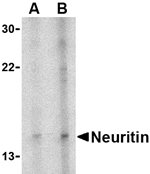As the nervous system of a complex organism develops, it establishes functional networks through the growth and retraction of synaptic connections from growing axons and dendrites. This synaptic remodeling involves neuro-transmitter signaling, activation of neurotrophin receptors and alterations in gene expression. One such gene whose expression is increased by neural activity is neuritin, a GPI-anchored protein that is expressed in postmitotic differentiating neurons of the developing nervous system. Its expression is also induced by the neurotrophins BDNF and NT-3. Purified recombinant neuritin promotes neurite outgrowth and arborization in primary embryonic neuronal cultures, suggesting that neuritin may play a role as a downstream effector of activity-induced neurite outgrowth. More recent experiments have shown that neuritin is required for the androgen-induced axonal elongation in motor neurons and is upregulated following spinal cord injury, suggesting that neuritin may also play a role in survival and axonal regeneration.


